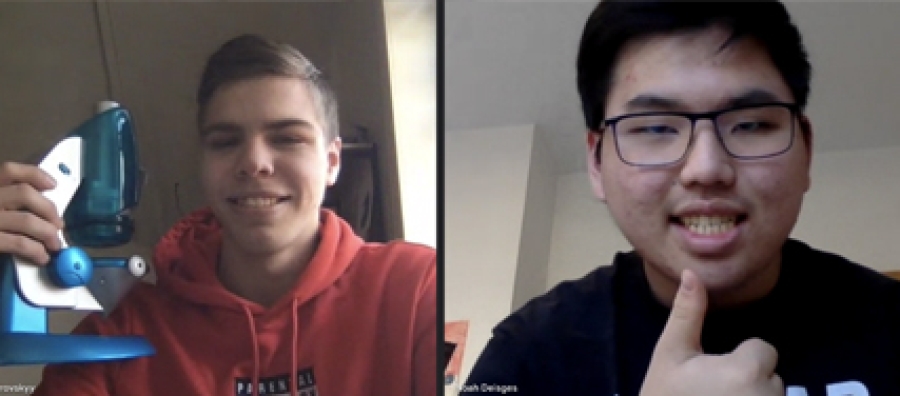The unusual solution to the problem of keeping the ISS clean is the brainchild of Oleg Shkarovskyy and Noah Deisges, who will fly to the Kennedy Space Center in Florida to watch their design being built and fine-tuned, before witnessing the launch of the rocket that will take it into space.
The pair’s idea involves using antibacterial slime to replace wet wipes as an easier and more environmentally friendly way of keeping the delicate equipment on the ISS free from potentially harmful dust and dirt.
Oleg and Noah are pupils at Minera’s Virtual Academy, a unique online independent school for children aged 12 to 18. They undertook their experiment as part of the school’s World Changers Programme - a cross-curricular and extra-curricular programme that partners students with select institutions to enrich their studies through applications in the real-world. It was entered into, and won, the International Space School Educational Trust’s (ISSET) Launch Prize.
Because of the virtual nature of their studies Oleg, from Ukraine, and Noah, from Luxembourg have never met each other in person and will meet for the first time when they fly to Florida next year to watch the final touches being put to their experiment.
The challenge set by ISSET was to come up with an experiment ‘to better life for mankind, on or off the planet’.
Noah, 17, said: “I feel really, really proud that of all the entries, ours is the one that won. It’s like winning the euromillions! I was doing schoolwork and suddenly my phone rang. I saw it was Oleg and he said to me: ‘Noah, Noah, did you check your email yet - we won! We won!”
Oleg, 15, said: “When I received the email, I thought it was a letter to make us feel better after we hadn’t won, so I closed it. Then I opened it again and saw the subtitle, which said: ‘You’re the winners!’ Then I started reading the email - each line was even harder and harder to read. I just wanted to call everyone on earth. But Noah was the first person I called.”
“It's unbelievable how much Nasa has advanced and the opportunities they are offering to the younger generations. Still, each time I think about the fact that our experiment will go into space, I get a buzz of joy and amazement in my head.”
Oleg said he thought the judges had selected their experiment because of its “simplicity and utility”.
“We analysed the issues in space, adapted to the conditions and found a simple solution,” he said. “That is the key in persuading the judges, nothing overcomplicated.”
Describing the experiment, Noah said "The abnormal behaviour of water in microgravity makes cleaning tiring and time-consuming with no guarantee of complete sanitisation. Crumbs from food, hairs and dead skin cells are also a problem in microgravity as they can contaminate every surface and even cause issues with electricals or get into astronauts eyes.
“Astronauts currently tend to use disposable wipes, liquid detergent and disposable plastic gloves, but these are neither environmentally friendly nor particularly practical, as space on the ISS is at a premium.
“This got us thinking of ways to clean surfaces using materials that can be reused. We came up with the idea of using a slime mixture with antibacterial properties. It’s possible to make this mixture using household items, but it hasn’t yet been tested in a microgravity environment.
“We believe this could be a much better cleaning solution as it would stick to the ‘dirt’ and remove it from surfaces efficiently whilst also sanitising that surface. The slime would also be reusable when wiped clean and so would be a suitable solution to use for long periods. It would be particularly effective at cleaning more delicate areas like keyboards or buttons with lots of grooves that might be time consuming to properly clean with a wipe alone.”
The student’s prize-winning experiment will now be tested to see whether it can save space in Space as well as conserving our environment back down here on Earth.
The eight-week World Changers Programme saw Noah and Oleg develop their idea with input from Jack Child - Minerva Virtual Academy’s Deputy Head and Head of Chemistry - as well as from a team of Astronauts and Space Scientists at ISSET.
“ISSET were terrific at treating the students like real scientists,” said Jack. “They met with every group that submitted, explaining to them the pros and cons and helping them to think outside the box.”
Jack, who is also the two pupils’ mentor at Minerva’s Virtual Academy, was thrilled and very proud of their win.
“These two worked exceptionally hard, giving up time across the summer holidays to keep working on their experiment. I’m so glad their hard work has been rewarded,” he said.
“I mean, it is actual rocket science! “Normally I get questions from students that I’m comfortable answering, but these guys were working at such a level that encouraged me to do my own research, lessening the gap between teacher and student.
‘I’m proud of the school, the kind of development and opportunities we can offer, and the calibre of students that are choosing to enrol, but most of all, I’m proud of Oleg and Noah’s excitement and enthusiasm.
“ISSET works so well with World Changers. It’s an incredible prize and an incredible feat to have won it. Who knows where Oleg and Noah will go next.”
Oleg said: “Jack was inspiring us - motivating us and always there to keep us going. Sometimes I’d forget he was our supervisor - he was so eager for Noah and I to carry on and do it.
“This experiment brought all of us closer. I feel like I’ve known Noah and Jack for ages, even though we’ve never met in person.”
For more information visit ISSET launch prize programme

